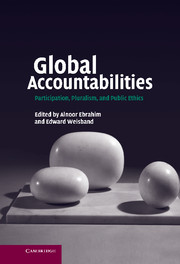Book contents
- Frontmatter
- Contents
- List of tables
- List of figures
- Acknowledgments
- List of contributors
- 1 Introduction: forging global accountabilities
- Part I Public accountability: participatory spheres from global to local
- Part II Experiments in forging NGO accountability: mutuality and context
- Part III Reflective accountability: new directions for participatory practices
- 8 A rights-based approach to accountability
- 9 Evaluation and accountability in emergency relief
- 10 Towards a reflective accountability in NGOs
- Part IV Global accountability frameworks and corporate social responsibility
- Index
- References
8 - A rights-based approach to accountability
Published online by Cambridge University Press: 22 September 2009
- Frontmatter
- Contents
- List of tables
- List of figures
- Acknowledgments
- List of contributors
- 1 Introduction: forging global accountabilities
- Part I Public accountability: participatory spheres from global to local
- Part II Experiments in forging NGO accountability: mutuality and context
- Part III Reflective accountability: new directions for participatory practices
- 8 A rights-based approach to accountability
- 9 Evaluation and accountability in emergency relief
- 10 Towards a reflective accountability in NGOs
- Part IV Global accountability frameworks and corporate social responsibility
- Index
- References
Summary
The explosive growth of NGOs all over the world, their variety of missions and structures, and the concerns raised by government and multinational authorities about them has prompted much discussion on NGO accountability. Accountability (the obligation to report on one's activities to a set of legitimate authorities) is the basic principle of responsible practice for any institution, public, private, or NGO (Edwards, 2002). NGO accountability discussions have arisen predominantly from government or other donor sources and have led to a series of accountability mechanisms like certification systems, rating systems, infrastructure and management capacity tools, and codes of conduct. These types of accountability mechanisms can be helpful in creating a standard in particular fields but do not reflect the value-base of NGO activities and can often seem to NGOs to be quite divorced from the mission of the organization. Furthermore, they do not address the rights of NGOs to operate (for example the right to associate freely) nor the responsibilities of NGOs to a wide array of stakeholders. Lastly, the complex web of relationships that mark the role of NGOs is not reflected in many accountability mechanisms.
This chapter tackles a question frequently raised in Part II of this book: How can NGOs reconcile their missions, values, and context with the top-down operational demands of accountability? The first section of this chapter reviews the state of play of NGO accountability. The second section questions the purpose of accountability discussions and introduces a framework of rights within which to view NGO activities.
- Type
- Chapter
- Information
- Global AccountabilitiesParticipation, Pluralism, and Public Ethics, pp. 151 - 167Publisher: Cambridge University PressPrint publication year: 2007
References
- 17
- Cited by



